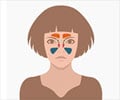Q: Which doctor should I consult for MERS?
A: You can consult a general physician or an internist or a family physician or an infectious disease doctor. MERS, or Middle East Respiratory Syndrome, refers to a viral infection, more commonly found in Middle East (hence the name), with severe flu-like symptoms and respiratory distress.
Q: Is MERS virus only found in the U.A.E?
A: More number of MERS cases has been identified in the U.A.E. However, other countries like Malaysia and Canada have also reported the infection.
Q: What causes MERS?
A: MERS is caused by a type of coronavirus, most of which usually causes common cold. The virus causing MERS is called MERS-CoV, earlier known as “novel coronavirus”.
Q: How is MERS different from common cold?
A: Unlike common cold, a person infected with MERS virus has high fever and can develop severe respiratory distress.
Q: How is MERS different from SARS?
A: MERS presents symptoms similar to SARS, or Severe Acute Respiratory Syndrome, but it can be differentiated by isolating the MERS virus.
Q: How severe is MERS?
A: MERS presents as a severe form of respiratory distress that can lead to death. The current mortality rate of MERS is about 50%.
Q: How does MERS spread?
A: MERS seems to spread only on close contact with the infected person or animals such as bats or camels.
Q: What is the risk of getting infected with MERS?
A: Luckily, MERS virus does not seem to spread rapidly. However, close contact with the infected person, like living with them or taking care, can spread the virus.
Q: Who is at risk of getting infected with MERS?
A: People with existing chronic conditions like diabetes, heart disease, renal disease, etc seem to be more at risk than others. MERS infection risk can increase for persons traveling to the Middle East countries.
Q: What are the symptoms of MERS?
A: High fever, cough and severe breathing problems are the main symptoms of MERS. Some people may have gastrointestinal problems like vomiting and diarrhea. A few are also known to develop acute renal failure.
Q: How to recognize MERS symptoms in others and self?
A: If a person has high fever and breathing difficulty, seek immediate medical help. Also look out for chillness and vomiting. While seeking medical help, inform the health care person about the countries travelled.
Q: How is MERS diagnosed?
A: Identifying clinical symptoms like high fever, cough and respiratory distress usually helps in diagnosis. However, MERS has to be differentiated from SARS, and this is possible with laboratory tests and isolation of the MERS-CoV virus.
Q: What is the treatment of MERS?
A: There is no known drug for MERS virus. The aim of treatment is to reduce and control the symptoms. Adequate rest, hydration, pain management and oxygen supplementation may be needed to manage a person infected with MERS virus.
Q: Is there a vaccine for MERS?
A: Commercially available vaccine for MERS virus is not yet available. A well-known pharmaceutical company has announced the production of vaccine for MERS-CoV. However, it is not yet approved by the FDA.








